Account Auto-Creation Defaults Maintenance Document
When integrating KFS with KC, it is possible to have the system automatically initiate and partially complete a KFS Account document based on information on the associated KC Award document. The KC Award e-doc cannot provide all of the data required to create an account, so the system refers to the Account Auto-Creation Defaults document in order to obtain the appropriate default values for the remaining required fields on the new Account document. In short, data obtained from the Account Auto-Creation Defaults maintenance document supplements data coming from KC to create a more complete Account document.
Your system may contain any number of Account Auto-Creation Defaults records, each of which allows you to establish defaults for accounts created in KC for a particular KC unit in your institution’s KC unit hierarchy. When an account is created based on a KC award, if no Account Auto-Creation Defaults record exists for the unit specified, the system climbs the KC unit hierarchy until it finds a KC unit for which defaults have been defined and uses those values.
|
|
Address field entries on the KFS Account e-doc may be derived from the KC Award or from the default document. The source used depends on your institution’s setting of the KC_OVERRIDES_KFS_DEFAULT_IND parameter. If this parameter is set to ‘Y,’ the KC Award is used as the source of address information on the account record. If the parameter is set to ‘N,’ the Account Auto-Creation Defaults record is used as the source. |
Navigation
Menu: Maintenance > Group: Contracts & Grants > Menu Group Link: CG Account Default > Lookup Screen: CG Account Default Lookup > Maintenance Document: Account Auto-Creation Defaults

Figure 2248 Navigation to and access method for Account Auto-Creation Defaults maintenance document lookup screen
Access
|
|
Note: The KFS-SYS Manager role permits you to access, create, and modify Account Auto-Creation Defaults maintenance documents in KFS. |
Document Lookup
The Lookup screen utilizes standard Kuali lookup functionality.
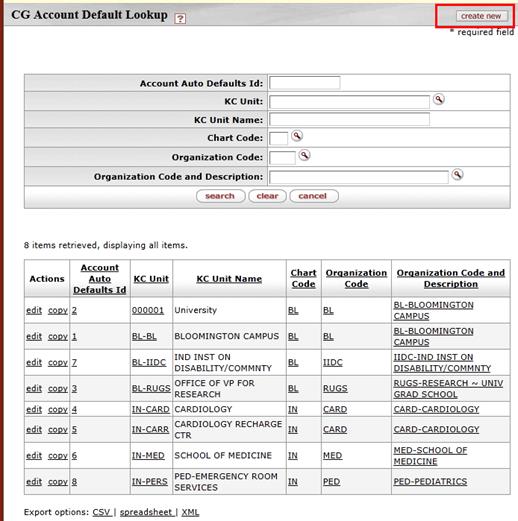
Figure 2249 CG Account Default Lookup Screen used to retrieve Account Auto-Creation Defaults maintenance documents – create new button, criteria fields, results table example
Document Layout
The Account Auto-Creation Defaults document is based on the standard KFS Account document and therefore includes many of the fields found in the Account document along with a few additional fields. In addition to the standard tabbed sections you find in most mainteance documents, the Account Auto-Creation Defaults maintenance e-doc also includes the following three unique tabbed sections: AccountAutoCreateDefault Maintenance, AccountAutoCreateDefault Responsibility, and Contracts and Grants.
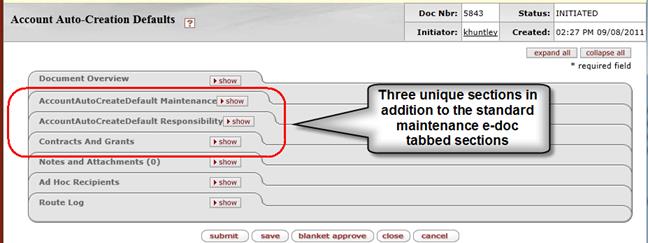
Figure 2250 Account Auto-Creation Defaults Maintenance Document – Three Unique Tabbed Sections
AccountAutoCreateDefault Maintenance Section
The fields in this section define account attributes for accounts created based on this default record. These fields are used in the application of business rules for transactions using the accounts, reporting options, and approval routing.
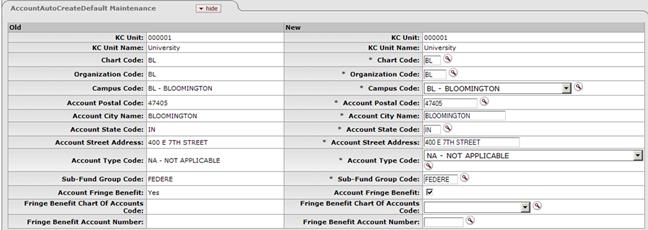
Figure 2251 AccountAutoCreateDefault Maintenance Section – Edit Mode Example
Table 1224 AccountAutoCreateDefault Maintenance Section - Field Descriptions
|
Field |
Description |
|
KC Unit |
Required in create mode, and display only in edit mode.
The Kuali Coeus unit code associated with all new accounts based on this
set of defaults. Search for the code from the KC Unit lookup
|
|
KC Unit Name |
Display only. The descriptive name of the KC unit associated with these new accounts. |
|
Chart Code |
Required. Enter the code or search for it from the
Chart
lookup |
|
Organization Code |
Required. Enter the number for the owner organization
of all new accounts based on this default, or search for it from the
Organization
lookup |
|
Campus Code |
Required. Select the physical campus on which the new
accounts are to be located from the Campus list,
or search for it from the lookup |
|
Account Postal Code |
Required. Enter the postal code assigned by the US
Postal Service for the city where the new accounts are to be managed, or
search for it from the Postal Code
lookup |
|
Account City Name |
Required. Enter the city where the new accounts are to be managed. |
|
Account State Code |
Required. Enter the code for the state where the new
accounts are to be managed, or search for it from the State lookup
|
|
Account Street Address |
Required. Enter the street address where the new accounts are to be managed. |
|
Account Type Code |
Required. Select from the Account Type
list or search for it from the lookup |
|
Sub-Fund Group Code |
Required. Enter the code which relates the new accounts
to a fund, or search for it from the Sub-Fund Group
lookup |
|
Account Fringe Benefit |
Optional. Select the check box if these new accounts are to accept fringe benefits or clear the check box if they are not to accept them. If the check box is not selected, a fringe benefits chart and fringe benefits account must be supplied to indicate where these charges should be posted. If it is not selected, fringe benefit Chart of Accounts code and fringe benefit account number are required and the fringe benefit account number must have been set up with the account fringe benefit code selected. |
|
Fringe Benefit Chart Of Accounts Code |
Optional. Select the chart code for the fringe benefits
account from the Chart list or
search for it from the lookup |
|
Fringe Benefit Account Number |
Optional. Enter the account that accepts fringe benefit
charges from the Account list,
or search for it from the lookup |
AccountAutoCreateDefault Responsibility Section
The fields in this section define the individuals responsible for all new accounts based on this set of defaults and provide continuation account information and Sufficient Funds parameters.
In edit mode, the system automatically enters data into both the Old and New sections, and all data fields are available for editing.
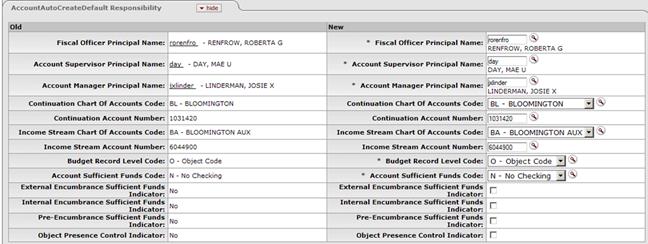
Figure 2252 AccountAutoCreateDefault Responsibility Section – Edit Mode Example
Table 1225 AccountAutoCreateDefault Responsibility Section – Field Descriptions
|
Field |
Description |
|
Fiscal Officer Principal Name |
Required. Enter the name of the fiscal
officer for all new accounts based on this set of defaults – this is the
individual responsible for the fiscal management of the account.
Click the lookup |
|
Account Supervisor Principal name |
Required. The supervisor oversees the
management of the accounts at a higher-level than the fiscal officer but
rarely receives any direct requests for action from the KFS. The account
supervisor cannot be the same as the fiscal officer or the account
manager. Click the lookup |
|
Account Manager Principal Name |
Required. The account manager has the
responsibility for ensuring that funds are spent and managed according to
the goals, objectives and mission of the organization, to ensure that the
funds are being spent according to a budgeted plan and that the allocation
of expenditures is appropriate to the function identified for the
account. Click the lookup |
|
Continuation Chart Of Accounts Code |
Enter the chart code for the continuation account for
the new accounts. The field is required if the account has an
expiration date. Use the drop-down |
|
Continuation Account Number |
Enter the account that is to accept transactions which
are being processed on the new accounts after the account expiration date.
Click the lookup |
|
Income Stream Chart Of Accounts Code |
Select the Chart of Accounts for the income stream
account from the Chart list, or search for it from the Chart lookup.
Parameters control when the income stream chart of accounts code and
income stream account number are required. Use the drop-down |
|
Income Stream Account Number |
Enter the account that is to receive any offset entries
from the new accounts in order to balance responsibility center activity
from the Account list. Click the lookup |
|
Budget Record Level Code |
Required. From the Budget Record
Level list, select the code that specifies that all new
accounts based on this set of defaults are to record budget by:
Use the drop-down |
|
Account Sufficient Funds Code |
Required. Select the code that
indicates at what level the new account are to be checked for sufficient
funds in the transaction processing environment from the Account Sufficient
Funds list. The choices are: Use the drop-down |
|
External Encumbrance Sufficient Funds Indicator |
Select the check box if external encumbrances are to be included in the new accounts’ calculation of sufficient funds. Clear the check box if they are not.
Click within the checkbox |
|
Internal Encumbrance Sufficient Funds Indicator |
Select the check box if internal encumbrances are to be included in the new accounts' calculation of sufficient funds. Clear the check box if they are not.
Click within the checkbox |
|
Pre-Encumbrance Sufficient Funds Indicator |
Select the check box if pre-encumbrances are to be included in the new accounts’ calculation of sufficient funds. Clear the check box if they are not.
Click within the checkbox |
|
Object Presence Control Indicator |
Select the check box to indicate that the new accounts
are to use object presence control. Clear the check box if they are not.
Object presence control requires that an object code be budgeted for the
account before it can be used on an actual or encumbrance transaction.
Click within the checkbox |
Contracts And Grants Section
The fields on this tab define attributes that are pertinent to Kuali Coeus contracts and grants accounts. These fields allow you to define how the new accounts based on this set of defaults automatically distribute indirect cost. It also identifies which members of the Contracts & Grants Processor role will be responsible for these accounts.

Figure 2253 Contracts And Grants Section – Edit Mode Example
Table 1226 Contracts And Grants Section – Field Descriptions
|
Field |
Description |
|
Indirect Cost Recovery Chart Of Accounts Code |
Enter the chart code for the indirect cost recovery
account that is to receive the indirect cost charged. Use the
drop-down |
|
Indirect Cost Recovery Account Number |
Enter the account number that is receiving the indirect
cost recovery income generated by the new accounts. Click the
lookup |
|
CG Account Responsibility Id |
Select an ID from the list to identify which members of
the Contracts & Grants Processor role in KFS should receive workflow
action requests for documents involving accounts created from this
default. Use the drop-down
|
Examples

Figure 2254 CG Account Default Lookup Result Example Values
Common Features
This maintenance document includes the following features that are common to most Kuali maintenance documents:
• Header Area
• Document Overview Tabbed Section
• Notes and Attachments Tabbed Section
• Ad Hoc Recipients Tabbed Section
• Route Log Tabbed Section
• Action Command Buttons
|
|
For information about how to use these common maintenance document components, see Common E-Doc Tabbed Sections, and Selection, Entry & Action Tools subtopics in the E-Doc Fundamentals topic within the KC User Manual or Online Help. |
Process
|
|
For general information about searching for, initiating, editing, copying, submitting, saving, closing, canceling, and/or routing a maintenance document, see “Common Maintenance E-Doc Procedures” in the Overview section of the KC User Manual or Online Help. |
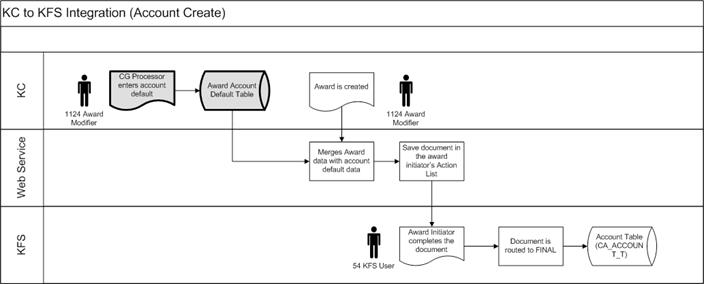
Figure 2255 KC to KFS Integration (Account Create) Process Flow Swim lane Diagram

 .
.
 An
account in the General Fund group cannot have a budget record level code
of 'Mixed.'
An
account in the General Fund group cannot have a budget record level code
of 'Mixed.' This
functionality does not currently exist and selecting the check boxes does
not control the inclusion or exclusion of the accounts from sufficient
funds calculation.
This
functionality does not currently exist and selecting the check boxes does
not control the inclusion or exclusion of the accounts from sufficient
funds calculation.
